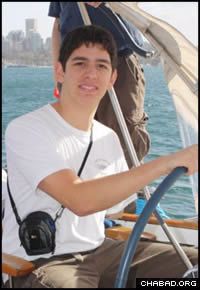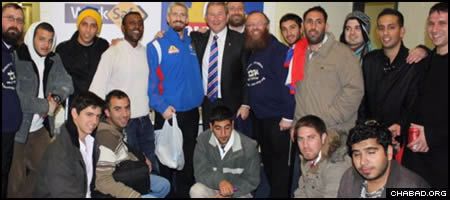Spurred by a special invitation from a Melbourne rabbi, 10 wounded Israeli soldiers embarked on a tour of Australia, using the time to challenge each other and spread their message of survival and defeating the odds.
Brought to the continent earlier this month by Chabad’s Terror Victims Project, the soldiers – some of whom were wounded in Israel’s winter offensive against Hamas terrorists in the Gaza Strip – were invited by Rabbi Yacov Barber, a Chabad-Lubavitch emissary who serves as rabbi of the South Caulfield Synagogue in Melbourne.
Barber came up with the idea a year ago after looking at a CTVP brochure highlighting a 2008 delegation of wounded soldiers that visited Aspen, Colo. for a skiing trip. When he saw a picture of a man without legs successfully skiing down a slope, Barber called CTVP director Rabbi Menachem Kutner to offer Australia as a destination.
In an interview, Barber noted that the current year is one of hakhel, a once-in-seven-years occurrence that during the times of the Holy Temple in Jerusalem was marked by a massive gathering of men, women and children. In his teachings on the subject, the Rebbe, Rabbi Menachem M. Schneerson, of righteous memory, stressed that in modern times, the hakhel year should be characterized by gatherings in Jewish communities throughout the world and a pervading sense of Jewish unity.
“I thought that if there was ever an appropriate time,” said Barber, “it was now.”
According to Jerusalem-based Rabbi Yossi Swerdlov, who helped lead the trip, “the trip took on a positive note from the very beginning.”
After taking off from Ben Gurion International Airport, the crew of the El Al flight delivered a special welcome to the soldiers over the plane’s loud speaker that was followed by a round of applause amongst the flight’s passengers. Some of the soldiers were even given a chance to meet with the pilot and first officer midair in the flight deck.
“Surely this burst of positivity and energy set the tone for the rest of the trip,” said Swerdlov.

Carried on Shoulders
The group began its tour in Sydney, accompanied by Rabbi Bentzion Milecki, a Chabad-Lubavitch emissary who serves as the rabbi of South Head Synagogue.
Swerdlov related that when the travellers arrived at the Sydney Harbor Bridge, the elevator was broken.
“Our soldiers, despite their injuries and pain, insisted on walking up the 200 steps anyway,” said the rabbi. “This is truly a measure of the courage and determination of these brave young men who don’t let anything get them down.”
Local families hosted the soldiers for meals. After one such meal, when the guests thanked their hosts for the hospitality, one of the residents replied: “We must thank you, for all that you have done for the Jewish people, not only in Israel, but worldwide.”
After two days in Sydney, the group then travelled to Melbourne, where they attended an Australian soccer match and met with players in the locker rooms. They ate a Friday night dinner at South Caulfield synagogue, where 200 people gathered to listen to the soldiers’ stories and express their gratitude for their sacrifices.
Barber carried one of the soldiers, Shmuel Mashasha, on his shoulders into the dining hall, while the crowd broke out into song to welcome their guests. Six of the soldiers related the challenges they’ve faced in overcoming their war-inflicted disabilities.
“Listening to their stories was a life-changing experience,” said Barber. “Their attitude to life is just incredible.”
“The trip itself was amazing,” reflected Izzy Ezagui, one of the participating soldiers. “Everything was planned down to the smallest detail. But the most important thing was the warmth and the heart-warming feeling that people care.”
“The bonding that took place between the soldiers was very inspiring,” commented Barber. “Only two soldiers knew each other before the trip, and yet they were all there for each other the entire time. If one was trying to do something that his physical disabilities didn’t allow, another would step in and help.”




Join the Discussion